Organisational Behaviour Report: Skills, Ethics, CSR, and Leadership
VerifiedAdded on 2021/01/03
|10
|2438
|457
Report
AI Summary
This report delves into organisational behaviour, focusing on the comparison of essential skills in management and leadership. It examines the roles of ethics and Corporate Social Responsibility (CSR) in developing effective leaders and managers, highlighting their qualities and skills. The report uses Sainsbury's as a case study, providing examples and discussing relevant leadership and management theories, such as situational and contingency theories, as well as bureaucratic and scientific management theories. The analysis underscores the importance of understanding human behaviour within organisations to achieve objectives, emphasizing the need for both effective management and leadership to drive productivity and efficiency. The report concludes by highlighting how the application of various theories contributes to achieving organisational goals and objectives. The report also discusses the importance of ethics and CSR in building good leaders and managers, and provides real-life examples to support the theories discussed.
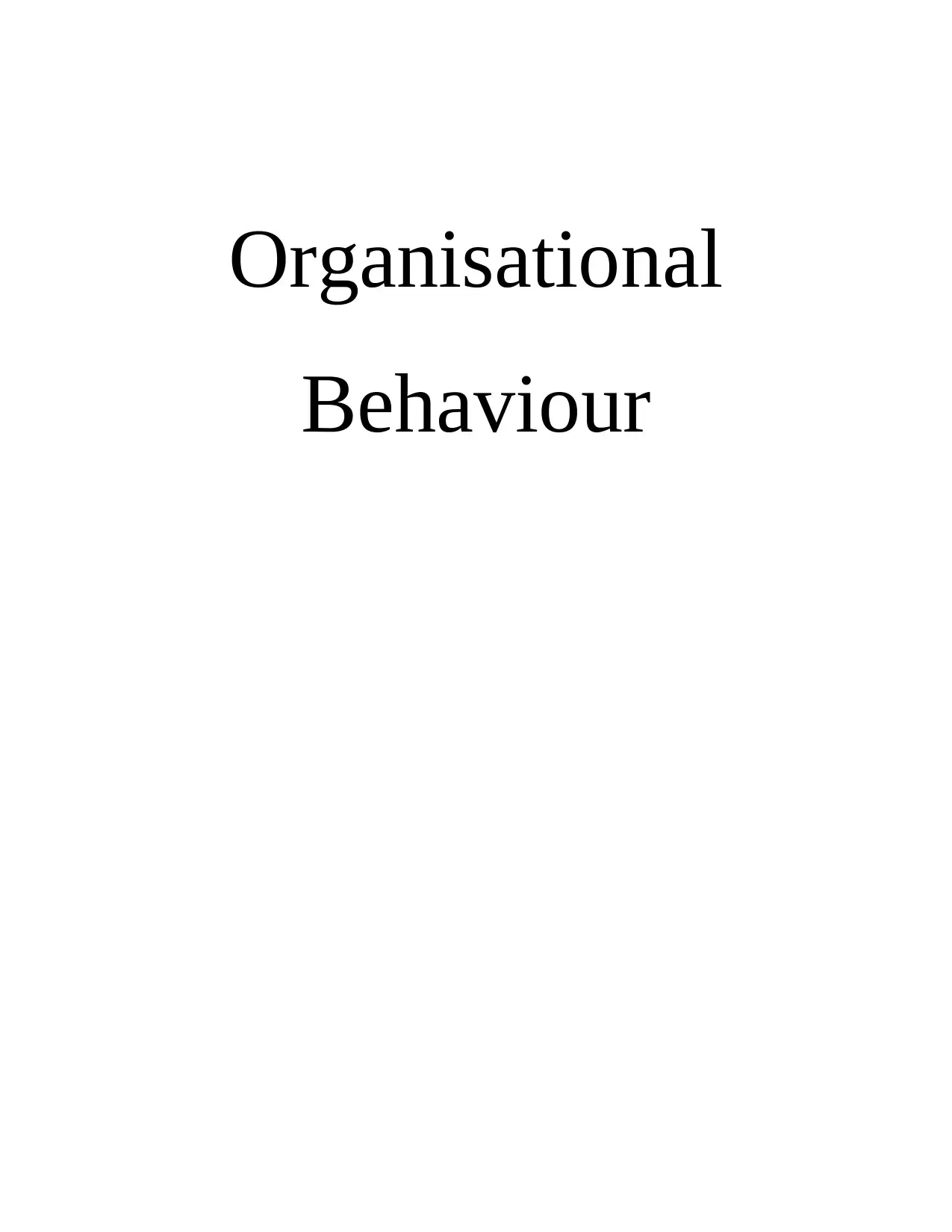
Organisational
Behaviour
Behaviour
Paraphrase This Document
Need a fresh take? Get an instant paraphrase of this document with our AI Paraphraser
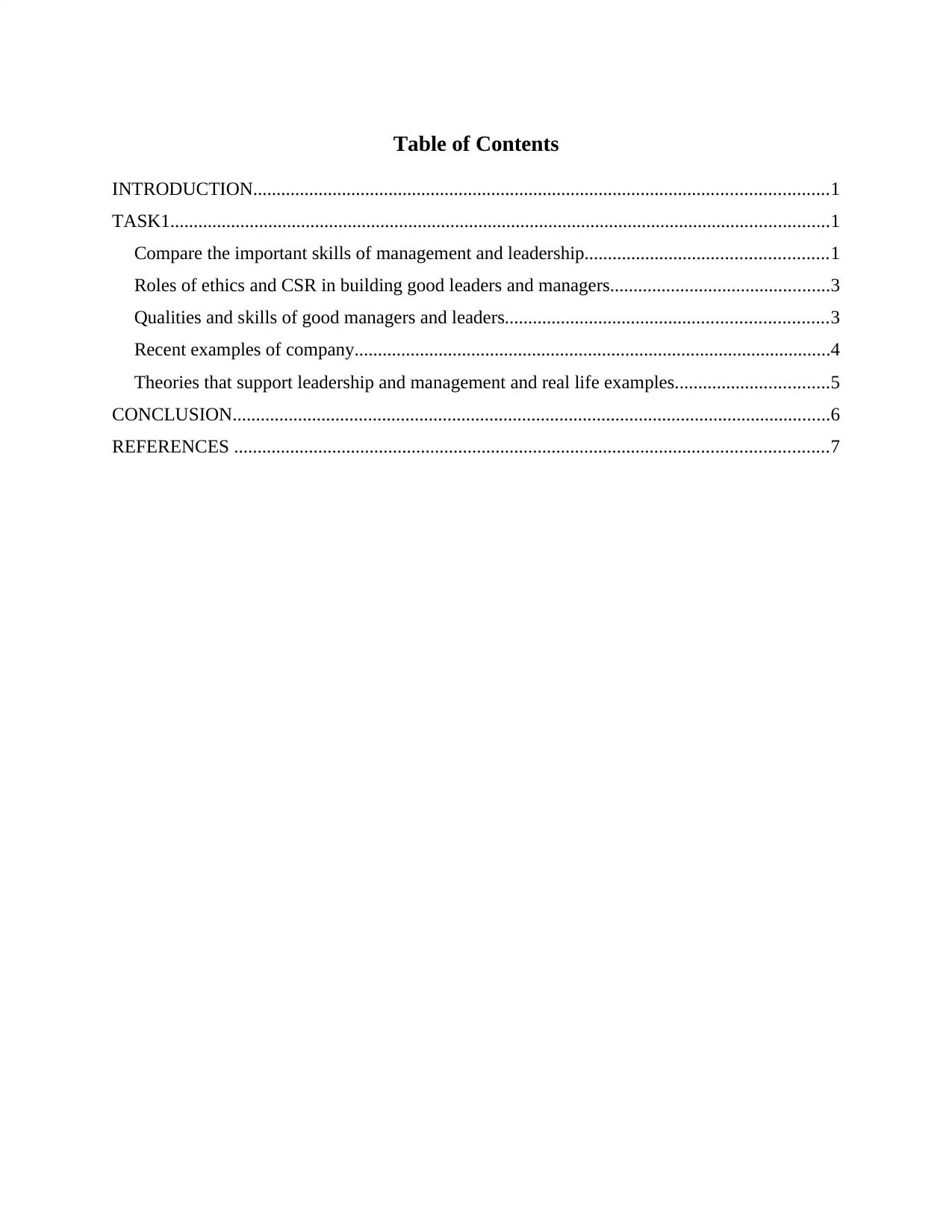
Table of Contents
INTRODUCTION...........................................................................................................................1
TASK1.............................................................................................................................................1
Compare the important skills of management and leadership....................................................1
Roles of ethics and CSR in building good leaders and managers...............................................3
Qualities and skills of good managers and leaders.....................................................................3
Recent examples of company......................................................................................................4
Theories that support leadership and management and real life examples.................................5
CONCLUSION................................................................................................................................6
REFERENCES ...............................................................................................................................7
INTRODUCTION...........................................................................................................................1
TASK1.............................................................................................................................................1
Compare the important skills of management and leadership....................................................1
Roles of ethics and CSR in building good leaders and managers...............................................3
Qualities and skills of good managers and leaders.....................................................................3
Recent examples of company......................................................................................................4
Theories that support leadership and management and real life examples.................................5
CONCLUSION................................................................................................................................6
REFERENCES ...............................................................................................................................7
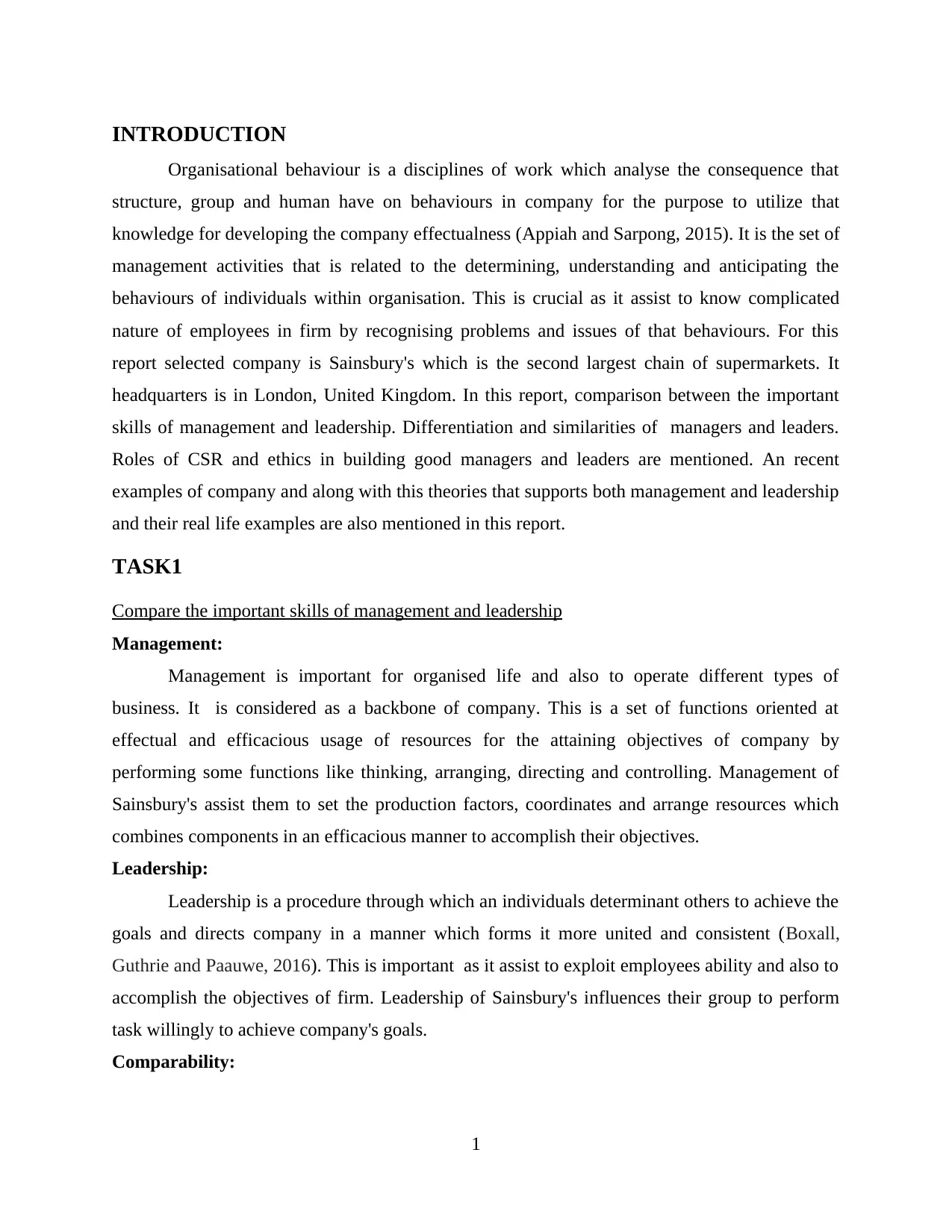
INTRODUCTION
Organisational behaviour is a disciplines of work which analyse the consequence that
structure, group and human have on behaviours in company for the purpose to utilize that
knowledge for developing the company effectualness (Appiah and Sarpong, 2015). It is the set of
management activities that is related to the determining, understanding and anticipating the
behaviours of individuals within organisation. This is crucial as it assist to know complicated
nature of employees in firm by recognising problems and issues of that behaviours. For this
report selected company is Sainsbury's which is the second largest chain of supermarkets. It
headquarters is in London, United Kingdom. In this report, comparison between the important
skills of management and leadership. Differentiation and similarities of managers and leaders.
Roles of CSR and ethics in building good managers and leaders are mentioned. An recent
examples of company and along with this theories that supports both management and leadership
and their real life examples are also mentioned in this report.
TASK1
Compare the important skills of management and leadership
Management:
Management is important for organised life and also to operate different types of
business. It is considered as a backbone of company. This is a set of functions oriented at
effectual and efficacious usage of resources for the attaining objectives of company by
performing some functions like thinking, arranging, directing and controlling. Management of
Sainsbury's assist them to set the production factors, coordinates and arrange resources which
combines components in an efficacious manner to accomplish their objectives.
Leadership:
Leadership is a procedure through which an individuals determinant others to achieve the
goals and directs company in a manner which forms it more united and consistent (Boxall,
Guthrie and Paauwe, 2016). This is important as it assist to exploit employees ability and also to
accomplish the objectives of firm. Leadership of Sainsbury's influences their group to perform
task willingly to achieve company's goals.
Comparability:
1
Organisational behaviour is a disciplines of work which analyse the consequence that
structure, group and human have on behaviours in company for the purpose to utilize that
knowledge for developing the company effectualness (Appiah and Sarpong, 2015). It is the set of
management activities that is related to the determining, understanding and anticipating the
behaviours of individuals within organisation. This is crucial as it assist to know complicated
nature of employees in firm by recognising problems and issues of that behaviours. For this
report selected company is Sainsbury's which is the second largest chain of supermarkets. It
headquarters is in London, United Kingdom. In this report, comparison between the important
skills of management and leadership. Differentiation and similarities of managers and leaders.
Roles of CSR and ethics in building good managers and leaders are mentioned. An recent
examples of company and along with this theories that supports both management and leadership
and their real life examples are also mentioned in this report.
TASK1
Compare the important skills of management and leadership
Management:
Management is important for organised life and also to operate different types of
business. It is considered as a backbone of company. This is a set of functions oriented at
effectual and efficacious usage of resources for the attaining objectives of company by
performing some functions like thinking, arranging, directing and controlling. Management of
Sainsbury's assist them to set the production factors, coordinates and arrange resources which
combines components in an efficacious manner to accomplish their objectives.
Leadership:
Leadership is a procedure through which an individuals determinant others to achieve the
goals and directs company in a manner which forms it more united and consistent (Boxall,
Guthrie and Paauwe, 2016). This is important as it assist to exploit employees ability and also to
accomplish the objectives of firm. Leadership of Sainsbury's influences their group to perform
task willingly to achieve company's goals.
Comparability:
1
⊘ This is a preview!⊘
Do you want full access?
Subscribe today to unlock all pages.

Trusted by 1+ million students worldwide
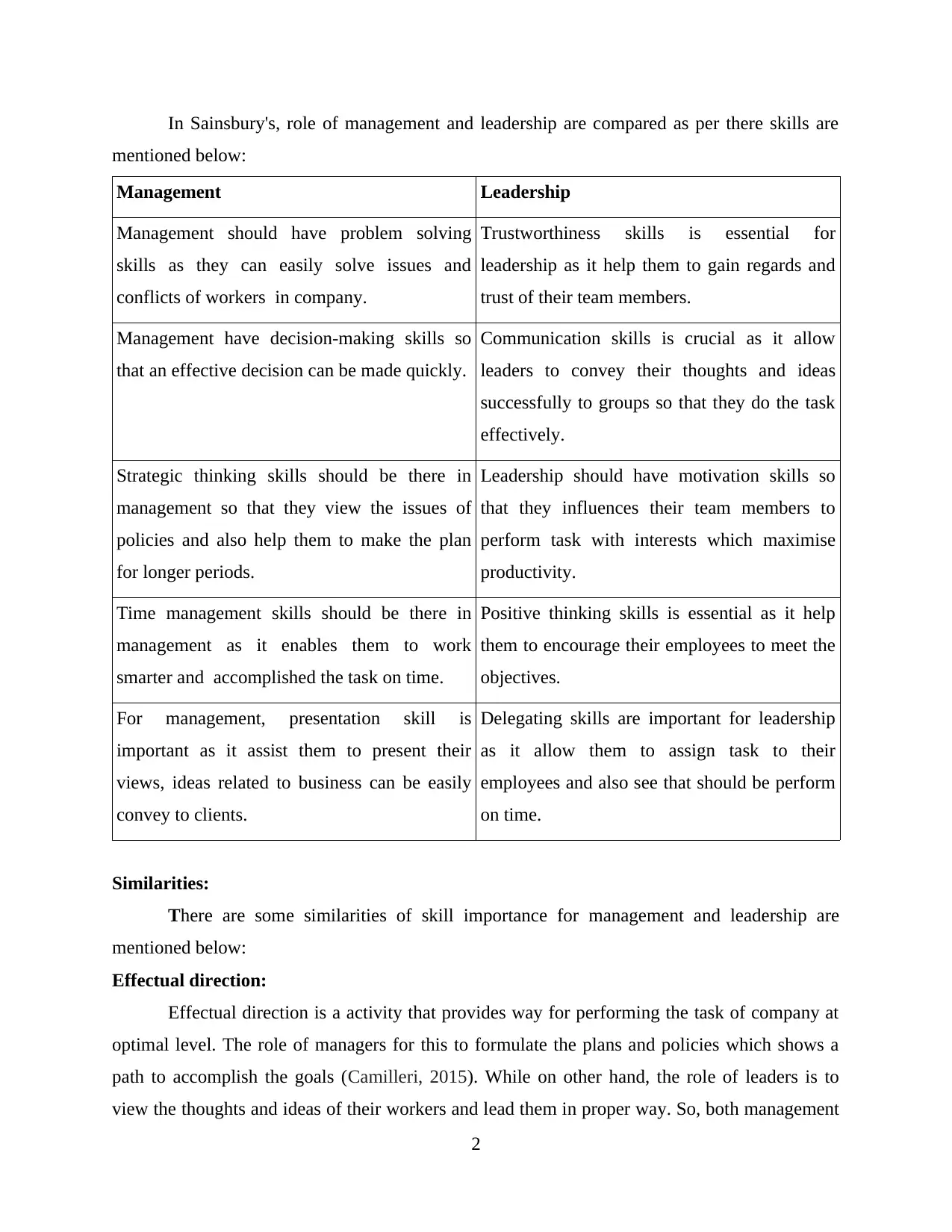
In Sainsbury's, role of management and leadership are compared as per there skills are
mentioned below:
Management Leadership
Management should have problem solving
skills as they can easily solve issues and
conflicts of workers in company.
Trustworthiness skills is essential for
leadership as it help them to gain regards and
trust of their team members.
Management have decision-making skills so
that an effective decision can be made quickly.
Communication skills is crucial as it allow
leaders to convey their thoughts and ideas
successfully to groups so that they do the task
effectively.
Strategic thinking skills should be there in
management so that they view the issues of
policies and also help them to make the plan
for longer periods.
Leadership should have motivation skills so
that they influences their team members to
perform task with interests which maximise
productivity.
Time management skills should be there in
management as it enables them to work
smarter and accomplished the task on time.
Positive thinking skills is essential as it help
them to encourage their employees to meet the
objectives.
For management, presentation skill is
important as it assist them to present their
views, ideas related to business can be easily
convey to clients.
Delegating skills are important for leadership
as it allow them to assign task to their
employees and also see that should be perform
on time.
Similarities:
There are some similarities of skill importance for management and leadership are
mentioned below:
Effectual direction:
Effectual direction is a activity that provides way for performing the task of company at
optimal level. The role of managers for this to formulate the plans and policies which shows a
path to accomplish the goals (Camilleri, 2015). While on other hand, the role of leaders is to
view the thoughts and ideas of their workers and lead them in proper way. So, both management
2
mentioned below:
Management Leadership
Management should have problem solving
skills as they can easily solve issues and
conflicts of workers in company.
Trustworthiness skills is essential for
leadership as it help them to gain regards and
trust of their team members.
Management have decision-making skills so
that an effective decision can be made quickly.
Communication skills is crucial as it allow
leaders to convey their thoughts and ideas
successfully to groups so that they do the task
effectively.
Strategic thinking skills should be there in
management so that they view the issues of
policies and also help them to make the plan
for longer periods.
Leadership should have motivation skills so
that they influences their team members to
perform task with interests which maximise
productivity.
Time management skills should be there in
management as it enables them to work
smarter and accomplished the task on time.
Positive thinking skills is essential as it help
them to encourage their employees to meet the
objectives.
For management, presentation skill is
important as it assist them to present their
views, ideas related to business can be easily
convey to clients.
Delegating skills are important for leadership
as it allow them to assign task to their
employees and also see that should be perform
on time.
Similarities:
There are some similarities of skill importance for management and leadership are
mentioned below:
Effectual direction:
Effectual direction is a activity that provides way for performing the task of company at
optimal level. The role of managers for this to formulate the plans and policies which shows a
path to accomplish the goals (Camilleri, 2015). While on other hand, the role of leaders is to
view the thoughts and ideas of their workers and lead them in proper way. So, both management
2
Paraphrase This Document
Need a fresh take? Get an instant paraphrase of this document with our AI Paraphraser
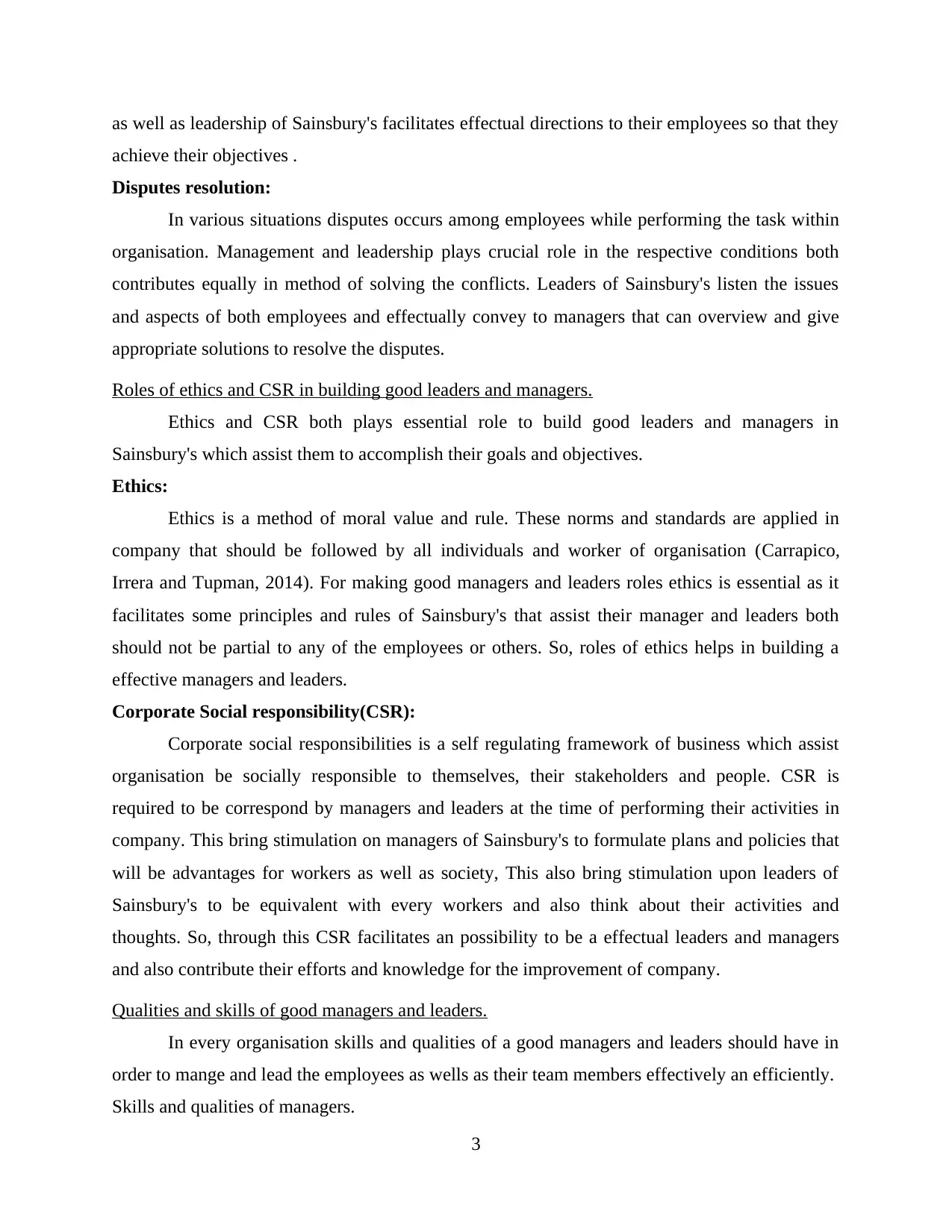
as well as leadership of Sainsbury's facilitates effectual directions to their employees so that they
achieve their objectives .
Disputes resolution:
In various situations disputes occurs among employees while performing the task within
organisation. Management and leadership plays crucial role in the respective conditions both
contributes equally in method of solving the conflicts. Leaders of Sainsbury's listen the issues
and aspects of both employees and effectually convey to managers that can overview and give
appropriate solutions to resolve the disputes.
Roles of ethics and CSR in building good leaders and managers.
Ethics and CSR both plays essential role to build good leaders and managers in
Sainsbury's which assist them to accomplish their goals and objectives.
Ethics:
Ethics is a method of moral value and rule. These norms and standards are applied in
company that should be followed by all individuals and worker of organisation (Carrapico,
Irrera and Tupman, 2014). For making good managers and leaders roles ethics is essential as it
facilitates some principles and rules of Sainsbury's that assist their manager and leaders both
should not be partial to any of the employees or others. So, roles of ethics helps in building a
effective managers and leaders.
Corporate Social responsibility(CSR):
Corporate social responsibilities is a self regulating framework of business which assist
organisation be socially responsible to themselves, their stakeholders and people. CSR is
required to be correspond by managers and leaders at the time of performing their activities in
company. This bring stimulation on managers of Sainsbury's to formulate plans and policies that
will be advantages for workers as well as society, This also bring stimulation upon leaders of
Sainsbury's to be equivalent with every workers and also think about their activities and
thoughts. So, through this CSR facilitates an possibility to be a effectual leaders and managers
and also contribute their efforts and knowledge for the improvement of company.
Qualities and skills of good managers and leaders.
In every organisation skills and qualities of a good managers and leaders should have in
order to mange and lead the employees as wells as their team members effectively an efficiently.
Skills and qualities of managers.
3
achieve their objectives .
Disputes resolution:
In various situations disputes occurs among employees while performing the task within
organisation. Management and leadership plays crucial role in the respective conditions both
contributes equally in method of solving the conflicts. Leaders of Sainsbury's listen the issues
and aspects of both employees and effectually convey to managers that can overview and give
appropriate solutions to resolve the disputes.
Roles of ethics and CSR in building good leaders and managers.
Ethics and CSR both plays essential role to build good leaders and managers in
Sainsbury's which assist them to accomplish their goals and objectives.
Ethics:
Ethics is a method of moral value and rule. These norms and standards are applied in
company that should be followed by all individuals and worker of organisation (Carrapico,
Irrera and Tupman, 2014). For making good managers and leaders roles ethics is essential as it
facilitates some principles and rules of Sainsbury's that assist their manager and leaders both
should not be partial to any of the employees or others. So, roles of ethics helps in building a
effective managers and leaders.
Corporate Social responsibility(CSR):
Corporate social responsibilities is a self regulating framework of business which assist
organisation be socially responsible to themselves, their stakeholders and people. CSR is
required to be correspond by managers and leaders at the time of performing their activities in
company. This bring stimulation on managers of Sainsbury's to formulate plans and policies that
will be advantages for workers as well as society, This also bring stimulation upon leaders of
Sainsbury's to be equivalent with every workers and also think about their activities and
thoughts. So, through this CSR facilitates an possibility to be a effectual leaders and managers
and also contribute their efforts and knowledge for the improvement of company.
Qualities and skills of good managers and leaders.
In every organisation skills and qualities of a good managers and leaders should have in
order to mange and lead the employees as wells as their team members effectively an efficiently.
Skills and qualities of managers.
3
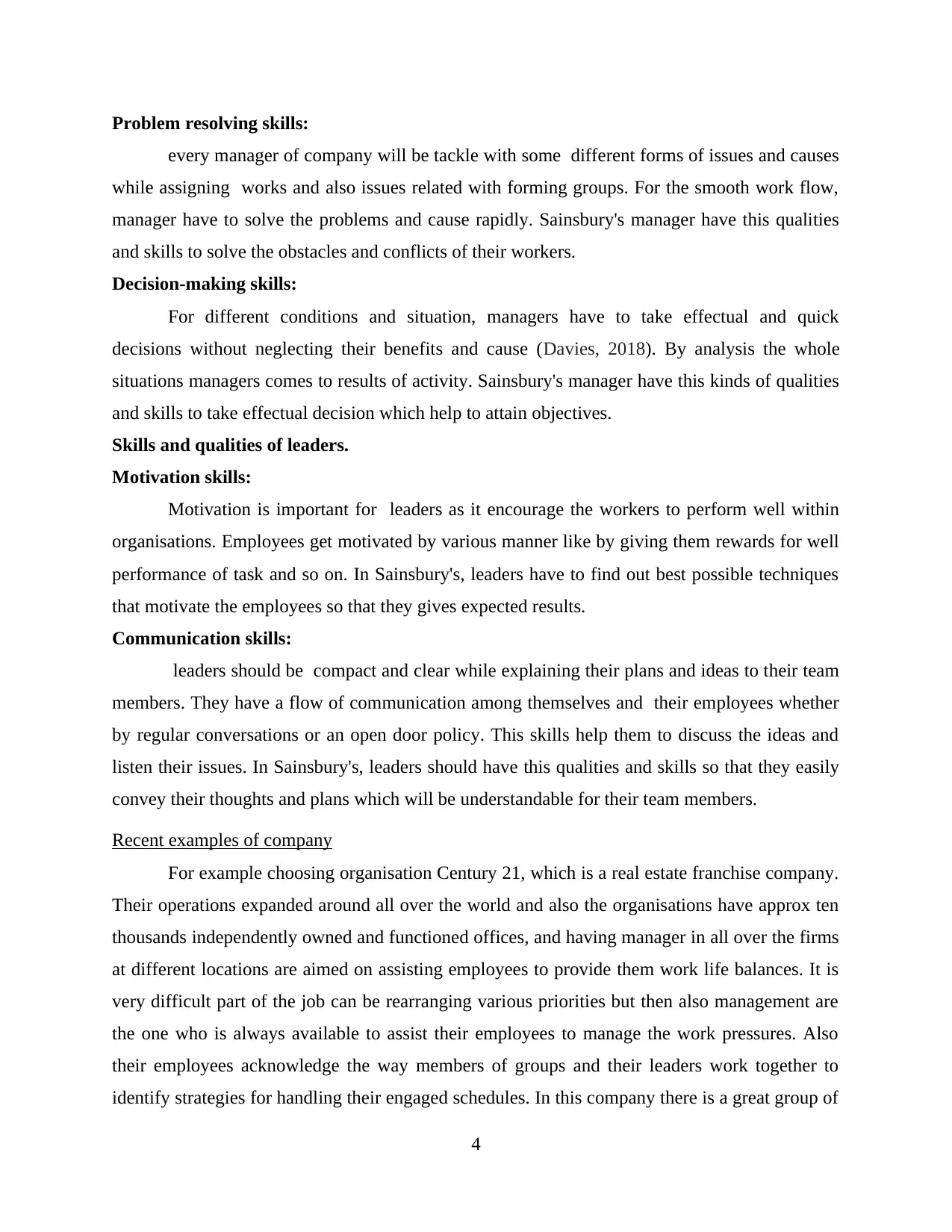
Problem resolving skills:
every manager of company will be tackle with some different forms of issues and causes
while assigning works and also issues related with forming groups. For the smooth work flow,
manager have to solve the problems and cause rapidly. Sainsbury's manager have this qualities
and skills to solve the obstacles and conflicts of their workers.
Decision-making skills:
For different conditions and situation, managers have to take effectual and quick
decisions without neglecting their benefits and cause (Davies, 2018). By analysis the whole
situations managers comes to results of activity. Sainsbury's manager have this kinds of qualities
and skills to take effectual decision which help to attain objectives.
Skills and qualities of leaders.
Motivation skills:
Motivation is important for leaders as it encourage the workers to perform well within
organisations. Employees get motivated by various manner like by giving them rewards for well
performance of task and so on. In Sainsbury's, leaders have to find out best possible techniques
that motivate the employees so that they gives expected results.
Communication skills:
leaders should be compact and clear while explaining their plans and ideas to their team
members. They have a flow of communication among themselves and their employees whether
by regular conversations or an open door policy. This skills help them to discuss the ideas and
listen their issues. In Sainsbury's, leaders should have this qualities and skills so that they easily
convey their thoughts and plans which will be understandable for their team members.
Recent examples of company
For example choosing organisation Century 21, which is a real estate franchise company.
Their operations expanded around all over the world and also the organisations have approx ten
thousands independently owned and functioned offices, and having manager in all over the firms
at different locations are aimed on assisting employees to provide them work life balances. It is
very difficult part of the job can be rearranging various priorities but then also management are
the one who is always available to assist their employees to manage the work pressures. Also
their employees acknowledge the way members of groups and their leaders work together to
identify strategies for handling their engaged schedules. In this company there is a great group of
4
every manager of company will be tackle with some different forms of issues and causes
while assigning works and also issues related with forming groups. For the smooth work flow,
manager have to solve the problems and cause rapidly. Sainsbury's manager have this qualities
and skills to solve the obstacles and conflicts of their workers.
Decision-making skills:
For different conditions and situation, managers have to take effectual and quick
decisions without neglecting their benefits and cause (Davies, 2018). By analysis the whole
situations managers comes to results of activity. Sainsbury's manager have this kinds of qualities
and skills to take effectual decision which help to attain objectives.
Skills and qualities of leaders.
Motivation skills:
Motivation is important for leaders as it encourage the workers to perform well within
organisations. Employees get motivated by various manner like by giving them rewards for well
performance of task and so on. In Sainsbury's, leaders have to find out best possible techniques
that motivate the employees so that they gives expected results.
Communication skills:
leaders should be compact and clear while explaining their plans and ideas to their team
members. They have a flow of communication among themselves and their employees whether
by regular conversations or an open door policy. This skills help them to discuss the ideas and
listen their issues. In Sainsbury's, leaders should have this qualities and skills so that they easily
convey their thoughts and plans which will be understandable for their team members.
Recent examples of company
For example choosing organisation Century 21, which is a real estate franchise company.
Their operations expanded around all over the world and also the organisations have approx ten
thousands independently owned and functioned offices, and having manager in all over the firms
at different locations are aimed on assisting employees to provide them work life balances. It is
very difficult part of the job can be rearranging various priorities but then also management are
the one who is always available to assist their employees to manage the work pressures. Also
their employees acknowledge the way members of groups and their leaders work together to
identify strategies for handling their engaged schedules. In this company there is a great group of
4
⊘ This is a preview!⊘
Do you want full access?
Subscribe today to unlock all pages.

Trusted by 1+ million students worldwide
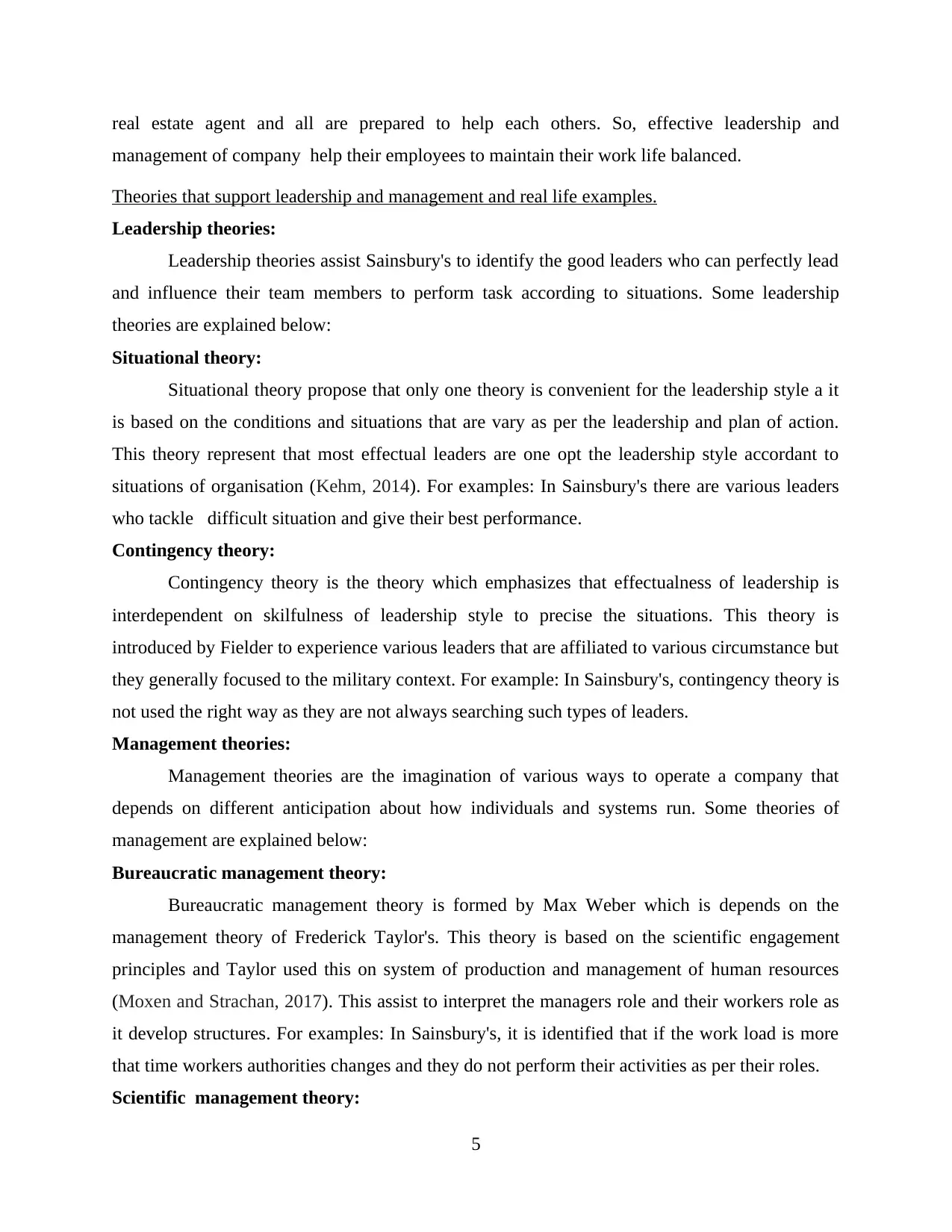
real estate agent and all are prepared to help each others. So, effective leadership and
management of company help their employees to maintain their work life balanced.
Theories that support leadership and management and real life examples.
Leadership theories:
Leadership theories assist Sainsbury's to identify the good leaders who can perfectly lead
and influence their team members to perform task according to situations. Some leadership
theories are explained below:
Situational theory:
Situational theory propose that only one theory is convenient for the leadership style a it
is based on the conditions and situations that are vary as per the leadership and plan of action.
This theory represent that most effectual leaders are one opt the leadership style accordant to
situations of organisation (Kehm, 2014). For examples: In Sainsbury's there are various leaders
who tackle difficult situation and give their best performance.
Contingency theory:
Contingency theory is the theory which emphasizes that effectualness of leadership is
interdependent on skilfulness of leadership style to precise the situations. This theory is
introduced by Fielder to experience various leaders that are affiliated to various circumstance but
they generally focused to the military context. For example: In Sainsbury's, contingency theory is
not used the right way as they are not always searching such types of leaders.
Management theories:
Management theories are the imagination of various ways to operate a company that
depends on different anticipation about how individuals and systems run. Some theories of
management are explained below:
Bureaucratic management theory:
Bureaucratic management theory is formed by Max Weber which is depends on the
management theory of Frederick Taylor's. This theory is based on the scientific engagement
principles and Taylor used this on system of production and management of human resources
(Moxen and Strachan, 2017). This assist to interpret the managers role and their workers role as
it develop structures. For examples: In Sainsbury's, it is identified that if the work load is more
that time workers authorities changes and they do not perform their activities as per their roles.
Scientific management theory:
5
management of company help their employees to maintain their work life balanced.
Theories that support leadership and management and real life examples.
Leadership theories:
Leadership theories assist Sainsbury's to identify the good leaders who can perfectly lead
and influence their team members to perform task according to situations. Some leadership
theories are explained below:
Situational theory:
Situational theory propose that only one theory is convenient for the leadership style a it
is based on the conditions and situations that are vary as per the leadership and plan of action.
This theory represent that most effectual leaders are one opt the leadership style accordant to
situations of organisation (Kehm, 2014). For examples: In Sainsbury's there are various leaders
who tackle difficult situation and give their best performance.
Contingency theory:
Contingency theory is the theory which emphasizes that effectualness of leadership is
interdependent on skilfulness of leadership style to precise the situations. This theory is
introduced by Fielder to experience various leaders that are affiliated to various circumstance but
they generally focused to the military context. For example: In Sainsbury's, contingency theory is
not used the right way as they are not always searching such types of leaders.
Management theories:
Management theories are the imagination of various ways to operate a company that
depends on different anticipation about how individuals and systems run. Some theories of
management are explained below:
Bureaucratic management theory:
Bureaucratic management theory is formed by Max Weber which is depends on the
management theory of Frederick Taylor's. This theory is based on the scientific engagement
principles and Taylor used this on system of production and management of human resources
(Moxen and Strachan, 2017). This assist to interpret the managers role and their workers role as
it develop structures. For examples: In Sainsbury's, it is identified that if the work load is more
that time workers authorities changes and they do not perform their activities as per their roles.
Scientific management theory:
5
Paraphrase This Document
Need a fresh take? Get an instant paraphrase of this document with our AI Paraphraser
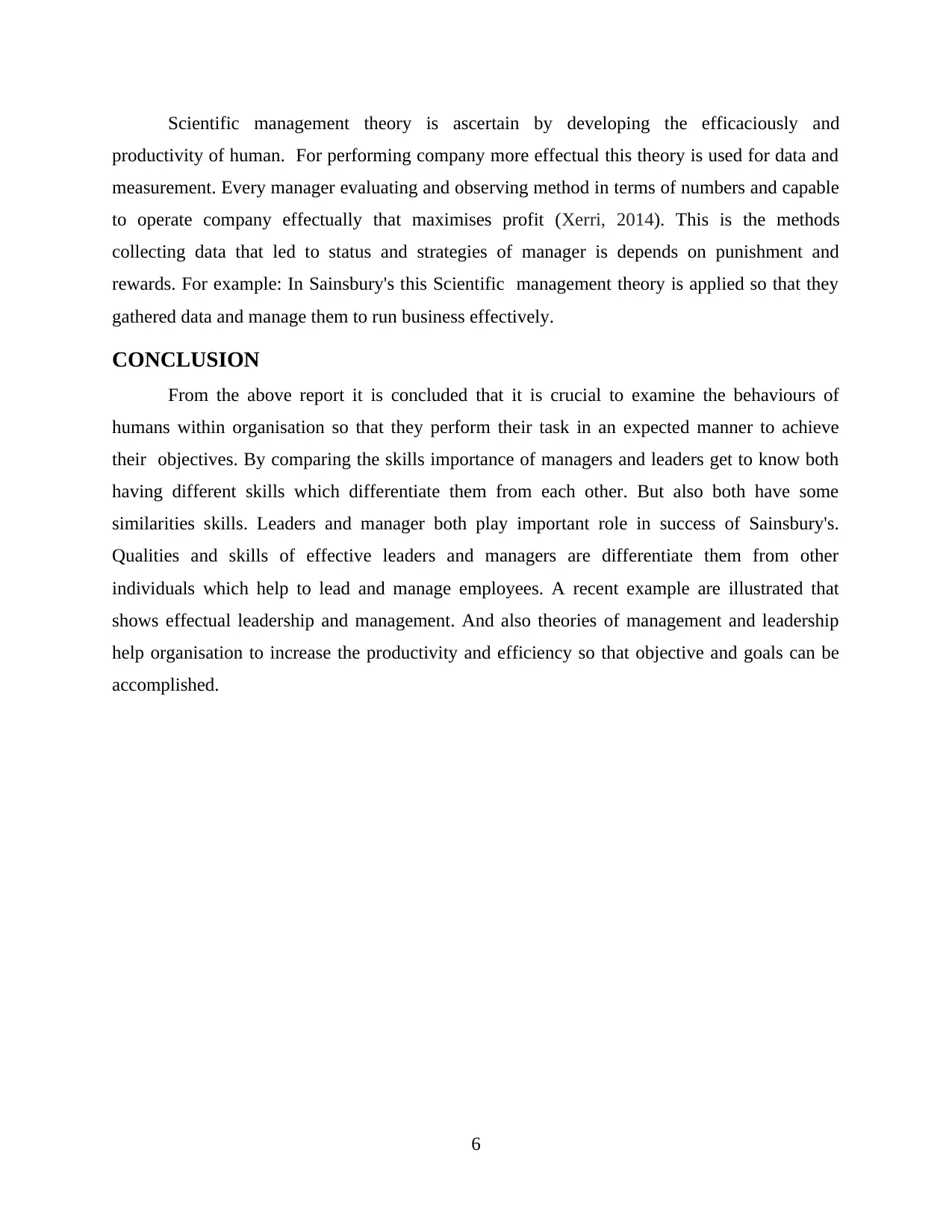
Scientific management theory is ascertain by developing the efficaciously and
productivity of human. For performing company more effectual this theory is used for data and
measurement. Every manager evaluating and observing method in terms of numbers and capable
to operate company effectually that maximises profit (Xerri, 2014). This is the methods
collecting data that led to status and strategies of manager is depends on punishment and
rewards. For example: In Sainsbury's this Scientific management theory is applied so that they
gathered data and manage them to run business effectively.
CONCLUSION
From the above report it is concluded that it is crucial to examine the behaviours of
humans within organisation so that they perform their task in an expected manner to achieve
their objectives. By comparing the skills importance of managers and leaders get to know both
having different skills which differentiate them from each other. But also both have some
similarities skills. Leaders and manager both play important role in success of Sainsbury's.
Qualities and skills of effective leaders and managers are differentiate them from other
individuals which help to lead and manage employees. A recent example are illustrated that
shows effectual leadership and management. And also theories of management and leadership
help organisation to increase the productivity and efficiency so that objective and goals can be
accomplished.
6
productivity of human. For performing company more effectual this theory is used for data and
measurement. Every manager evaluating and observing method in terms of numbers and capable
to operate company effectually that maximises profit (Xerri, 2014). This is the methods
collecting data that led to status and strategies of manager is depends on punishment and
rewards. For example: In Sainsbury's this Scientific management theory is applied so that they
gathered data and manage them to run business effectively.
CONCLUSION
From the above report it is concluded that it is crucial to examine the behaviours of
humans within organisation so that they perform their task in an expected manner to achieve
their objectives. By comparing the skills importance of managers and leaders get to know both
having different skills which differentiate them from each other. But also both have some
similarities skills. Leaders and manager both play important role in success of Sainsbury's.
Qualities and skills of effective leaders and managers are differentiate them from other
individuals which help to lead and manage employees. A recent example are illustrated that
shows effectual leadership and management. And also theories of management and leadership
help organisation to increase the productivity and efficiency so that objective and goals can be
accomplished.
6
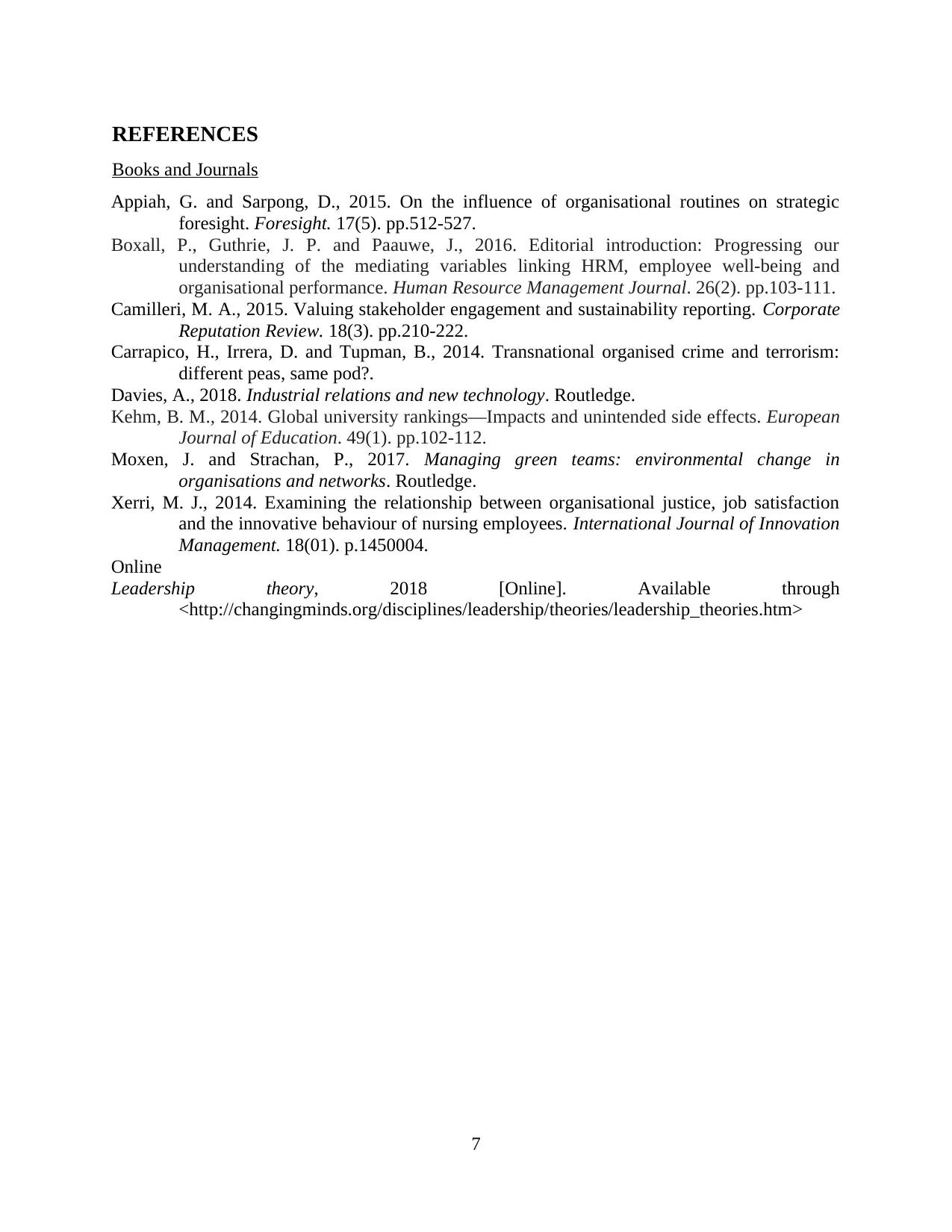
REFERENCES
Books and Journals
Appiah, G. and Sarpong, D., 2015. On the influence of organisational routines on strategic
foresight. Foresight. 17(5). pp.512-527.
Boxall, P., Guthrie, J. P. and Paauwe, J., 2016. Editorial introduction: Progressing our
understanding of the mediating variables linking HRM, employee well‐being and
organisational performance. Human Resource Management Journal. 26(2). pp.103-111.
Camilleri, M. A., 2015. Valuing stakeholder engagement and sustainability reporting. Corporate
Reputation Review. 18(3). pp.210-222.
Carrapico, H., Irrera, D. and Tupman, B., 2014. Transnational organised crime and terrorism:
different peas, same pod?.
Davies, A., 2018. Industrial relations and new technology. Routledge.
Kehm, B. M., 2014. Global university rankings—Impacts and unintended side effects. European
Journal of Education. 49(1). pp.102-112.
Moxen, J. and Strachan, P., 2017. Managing green teams: environmental change in
organisations and networks. Routledge.
Xerri, M. J., 2014. Examining the relationship between organisational justice, job satisfaction
and the innovative behaviour of nursing employees. International Journal of Innovation
Management. 18(01). p.1450004.
Online
Leadership theory, 2018 [Online]. Available through
<http://changingminds.org/disciplines/leadership/theories/leadership_theories.htm>
7
Books and Journals
Appiah, G. and Sarpong, D., 2015. On the influence of organisational routines on strategic
foresight. Foresight. 17(5). pp.512-527.
Boxall, P., Guthrie, J. P. and Paauwe, J., 2016. Editorial introduction: Progressing our
understanding of the mediating variables linking HRM, employee well‐being and
organisational performance. Human Resource Management Journal. 26(2). pp.103-111.
Camilleri, M. A., 2015. Valuing stakeholder engagement and sustainability reporting. Corporate
Reputation Review. 18(3). pp.210-222.
Carrapico, H., Irrera, D. and Tupman, B., 2014. Transnational organised crime and terrorism:
different peas, same pod?.
Davies, A., 2018. Industrial relations and new technology. Routledge.
Kehm, B. M., 2014. Global university rankings—Impacts and unintended side effects. European
Journal of Education. 49(1). pp.102-112.
Moxen, J. and Strachan, P., 2017. Managing green teams: environmental change in
organisations and networks. Routledge.
Xerri, M. J., 2014. Examining the relationship between organisational justice, job satisfaction
and the innovative behaviour of nursing employees. International Journal of Innovation
Management. 18(01). p.1450004.
Online
Leadership theory, 2018 [Online]. Available through
<http://changingminds.org/disciplines/leadership/theories/leadership_theories.htm>
7
⊘ This is a preview!⊘
Do you want full access?
Subscribe today to unlock all pages.

Trusted by 1+ million students worldwide

8
1 out of 10
Related Documents
Your All-in-One AI-Powered Toolkit for Academic Success.
+13062052269
info@desklib.com
Available 24*7 on WhatsApp / Email
![[object Object]](/_next/static/media/star-bottom.7253800d.svg)
Unlock your academic potential
Copyright © 2020–2025 A2Z Services. All Rights Reserved. Developed and managed by ZUCOL.




